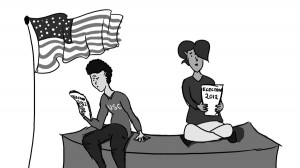Student vote can affect community
America calls itself the inventor of modern democracy, yet with a mere 62 percent voter turnout for the last presidential election, voter participation in the United States is one of the lowest for any democratic country in the world.
Nearly 40 percent of Americans forfeited their right — and civic duty — to vote in 2008. Some argue that voting is pointless: Unless they live in a swing state, the winners of their state’s electoral votes are predetermined regardless of how they choose to vote.
But voting is not exclusively about choosing the next president. USC students who are registered to vote in California have the chance to make a huge community impact by voting on state measures and local offices.
The ballot California voters will see in two weeks lists several monumental propositions that students should examine.
Proposition 30, which has received considerable media attention over the last several months, impacts youth and higher education directly. It plans for a small increase in state taxes for those whose annual income stands at $250,000 and above in order to fund public education, particularly state universities and community colleges.
Prop. 30 also proposes to direct a portion of the expected additional revenue to local public safety initiatives. Voting yes on Prop. 30 is thus a chance to support a safer Los Angeles as well as increased educational opportunities for our generation.
The opposing measure, Proposition 38, proposes a tax increase for all Californians, regardless of income. The increased revenue would go toward K-12 schools and early childhood programs, although 30 percent would be used to pay down state bond debt for the first four years.
Students thus are presented with a choice between two solutions to the state education and budget crisis facing our generation — or the choice to vote no on both propositions and make personal efforts to find and promote a better option.
In addition to community education, student voters can also impact community health and safety.
One ballot measure, Proposition 37, will require the labeling of genetically engineered foods. The safety of these foods for consumption remains uncertain; however, a growing body of research has linked them to allergies, organ toxicity and other health problems. Furthermore, in a city such as Los Angeles where there is a massive problem with low-income families’ access to healthy food and nutrition education, the right to know a food’s content is particularly important.
Another ballot measure, Proposition 34, would provide a one-time government grant of $100 million to law enforcement agencies for the investigations of homicide and rape cases. The grant would be made possible by eliminating the death penalty and accompanying high costs, such as the appeals process and the upkeep of death row.
The upcoming L.A. ballot also requests that voters choose a candidate for several state and local positions, among which is L.A. County’s District Attorney.
USC students now have the chance to evaluate the legal climate in Los Angeles that has been implemented by Chief Deputy District Attorney Jackie Lacey and whether or not her opponent, Prosecutor Alan Jackson, can do a better job. Jackson has experience prosecuting gang homicide, which is a serious problem in L.A. County; however, might his background increase tension surrounding recent controversial crackdowns on gang activity?
USC students should take particular interest in offices and ballot measures related to crime, not only because of the reality of crime within and around our campus gates, but also because crime dictates community atmosphere and resource allocation. We should support propositions and candidates who we believe will make Los Angeles a safer place, so all residents can maintain a better quality of life.
Whatever students think is the best way to improve their community, they have a right and a responsibility to express their beliefs by voting. The more a community represents itself, the more everyone can benefit from a representative government. USC students can make their particular interests heard, but only if they agree to participate in the democratic process.
Francesca Bessey is a sophomore majoring in narrative studies and international relations. Her column “Open Campus” runs Wednesdays.

